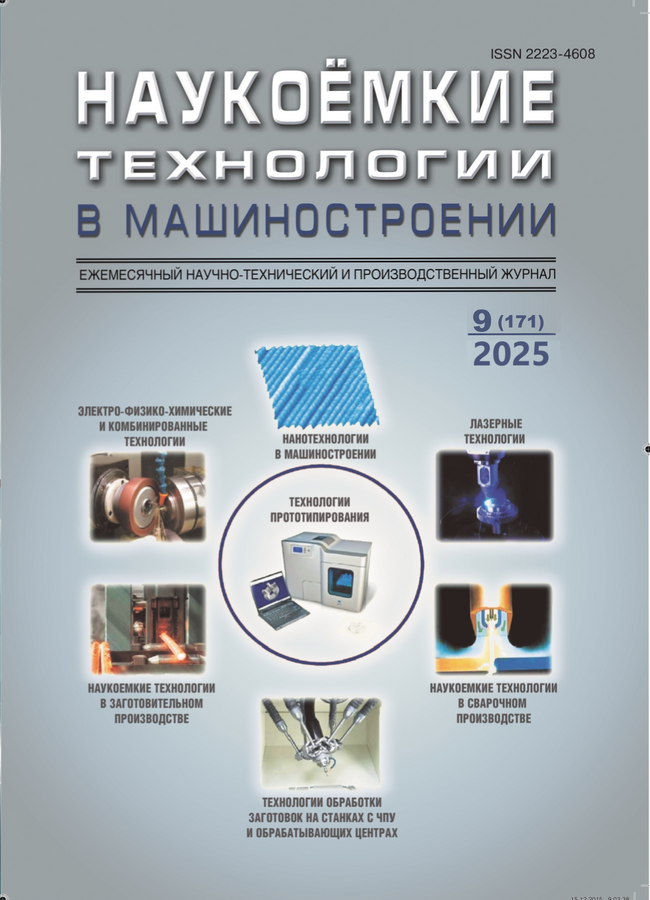WAVE STRAIN HARDENING IN THE ADDITIVE SYNTHETIC PROCESS
- 作者: Kirichek A.V.1, Solovyev D.L.2, Barinov S.V.2, Fedonina S.O.1
-
隶属关系:
- Bryansk State Technical University
- Vladimir State University
- 期: 编号 9 (171) (2025)
- 页面: 31-40
- 栏目: Technologies of electromachining and combined processing
- URL: https://bakhtiniada.ru/2223-4608/article/view/349960
- DOI: https://doi.org/10.30987/2223-4608-2025-9-31-40
- ID: 349960
如何引用文章
全文:
详细
The article discusses a hybrid technology that combines additive manufacturing of metal products using the WAAM technique and wave strain hardening aimed at improving the mechanical characteristics of the parts being created. WAAM technology is an additive manufacturing technique that through an electric arc melts metal wire, making three D metal products by layering. This technology combines the principles of traditional welding production and additive methods, making efficient parts production of complex shapes possible. Key advantages of WAAM technology are the following: speed of production, which reduces costs, as well as the ability to manufacture large and complex parts that are difficult or impossible to make using traditional techniques. However, when synthesizing products, the most popular problems are heterogeneity of microstructure, porosity and coarse- grain zones, which result in strength loss. To overcome these problems, it is recommended to use wave strain hardening, which provides a significant increase in the depth of hardening, creates compressive residual stresses and promotes fine grinding of the granular structure. A finite element model has been developed in ANSYS for the analysis of temperature fields and mechanical loads in a hybrid process. The simulation made it possible to optimize the modes of synthesis and wave strain hardening, taking into account thermal deformation effects. Experimental studies on the ES868 alloy have confirmed the effectiveness of the approach: the use of wave strain hardening resulted in structure refirenment (up to 10 times), hardness increase by 2,5 times, tensile strength by 1,5 times and yield strength by 2 times at one and the same toughness. The results prove the potential of hybrid WAAM technology and wave strain hardening for large-sized parts manufacturing with improved performance characteristics.
作者简介
Andrey Kirichek
Bryansk State Technical University
Email: avkbgtu@gmail.com
ORCID iD: 0000-0002-3823-0501
SPIN 代码: 6910-0233
Scopus 作者 ID: 6506677389
professor, doctor of technical sciences
Dmitriy Solovyev
Vladimir State University
Email: avkbgtu@gmail.com
ORCID iD: 0000-0002-4475-319X
Sergey Barinov
Vladimir State University
编辑信件的主要联系方式.
Email: avkbgtu@gmail.com
ORCID iD: 0000-0002-1341-446X
Svetlana Fedonina
Bryansk State Technical University
Email: fedonina.sv2015@gmail.com
ORCID iD: 0000-0002-0472-4845
Department of Metal Cutting Machines and Tools, candidate of technical sciences
参考
Tomar Bunty, Shiva S., Nath Tameshwer. A review on wire arc additive manufacturing: Processing parameters, defects, quality improvement and recent advances // Ma terials Today Communications, 2022. vol. 31. art. no. 103739. doi: 10.1016/j.mtcomm.2022.103739 Трубашевский Д.С. Аддитивные зарисовки, или решения для тех, кто не хочет продолжать терять деньги / Воронеж: Умное Производство, 2021. 203 с. Li Y., Su C., Zhu J. Comprehensive review of wire arc additive manufacturing: Hardware system, physical process, monitoring, property characterization, application and future prospects // Results in Engineering, 2022. vol. 13. art. no. 100330. doi: 10.1016/j.rineng.2021.100330. Srivastava M., Rathee S., Tiwari A., Dongre M. Wire arc additive manufacturing of metals: A review on processes, materials and their behaviour // Materials Chemistry and Physics. 2023. vol. 294. art. no. 126988. doi: 10.1016/j.matchemphys.2022.126988. Kou S. Welding Metallurgy – New Jersey: John Wiley & Sons, Inc, Hoboken, 2002. 461 p. doi: 10.1002/0471434027 Langelandsvik G., Akselsen O.M., Furu T., Roven H.J. Review of aluminum alloy development for wire arc additive manufacturing // Materials, 2021. vol. 14 (18). p. 5370. doi: 10.3390/ma14185370. Береснев А.Г. Разумовский И.М. Горячее изостатическое прессование для аддитивного производства // Аддитивные технологии. № 4 (2017). С. 50−54 Киричек А.В., Соловьев Д.Л., Федонина С.О. Проявление технологической наследственности при исследовании твердости деформационно-термически упрочненных сталей // Наукоемкие технологии в машиностроении. 2019. № 8 (98). С. 25−28.doi: 10.30987/article_5d2635сb4d7804.69744207 Xu X., Ganguly S., Ding J., Dirisu P., Martina F., Liu X., Williams S. W. Improving mechanical properties of wire plus arc additively manufactured maraging steel through plastic deformation enhanced aging response, Materials Science and Engineering: A, Volume 747, 2019, P. 111−118, https://doi.org/10.1016/j.msea.2018.12.114. Исследование влияния деформационного упрочнения на механические свойства образцов сплава АМг5, полученных способом многослойной наплавки // М.Ф. Карташев, Г.Л. Пермяков, Д.Н. Трушников, М.Р. Миндибаев. Вестник МГТУ им. Г.И. Носова. 2019. Т. 17. № 3. С. 38−45 Киричек А.В., Соловьев Д.Л., Лазуткин А.Г. Технология и оборудование статико-импульсной обработки поверхностным пластическим деформированием. Библиотека технолога. М.: Машиностроение, 2004. 288 с. Srivastava M., Rathee S., Tiwari A., Dongre M. Wire arc additive manufacturing of metals: A review on processes, materials and their behaviour // Materials Chemistry and Physics. 2023. Vol. 294. 126988. doi: 10.1016/j.matchemphys.2022.126988. Suvranshu P., Susanta K.S. Gas metal arc welding based additive manufacturing – a review // CIRP Journal of Manufacturing Science and Technology. 2021. Vol. 33. Pp. 398−442. doi: 10.1016/j.cirpj.2021.04.010. Киричек А.В., Баринов С.В., Греченева А.В. Расчет температурных полей на основе конечно-элементной модели процесса аддитивного синтеза изделия // Прикладная информатика. 2024. Т. 19. № 6. С. 113–128. doi: 10.37791/2687-0649-2024-19-6-113-128. Федонина С.О. Повышение качества синтезированных из проволоки деталей волновым термодеформационным упрочнением / Брянск. 2021. 154 с.
补充文件









